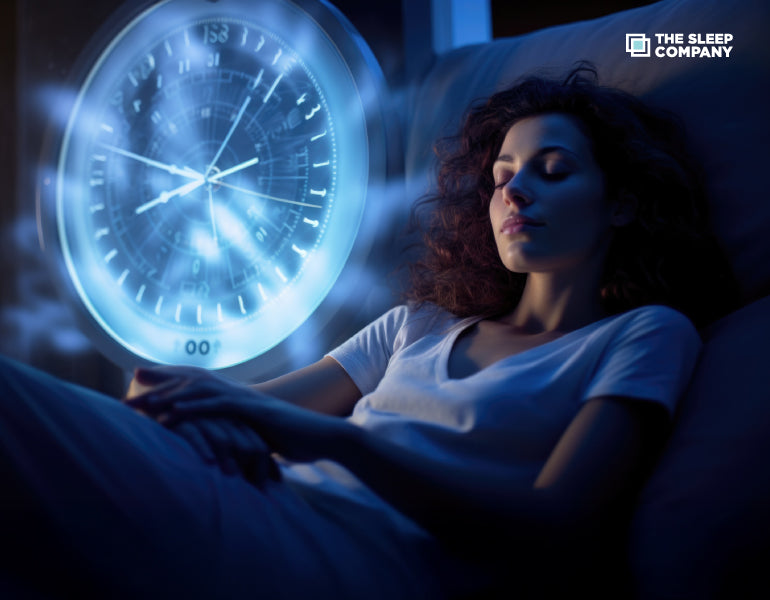My Cart

Circadian Rhythm - Effects, Treatments & Symptoms

Are you someone who craves a nap in the afternoon? Or perhaps you are a night owl who feels refreshed when it's dark outside.
Most of the time, we simply chalk it up as our quirks. But it's all because of our body's internal clock, known as the circadian rhythm.
Circadian rhythm tells you when you feel sleepy, alert, or productive. But when this internal clock doesn't function as it should, things seem out of sync.
But don't worry, we are here to steer you in the right direction. Ahead, we tell you everything about circadian rhythm, circadian rhythm disorder, and how you can overcome them. Let's unpack.
What Is Circadian Rhythm?
As mentioned earlier, circadian rhythm is your body's internal clock that decides when you feel awake, sleepy, or energized throughout the day.
Just like a normal clock runs on battery, your circadian rhythm is influenced by light, darkness, and daily routines. These rhythms help control sleep, hunger, hormones, and even body temperature.
That's why you may have noticed how there are a few hours in the day when you feel unstoppable and other times when you feel incredibly sluggish. Well, this ebb and flow is your circadian rhythm in action.
What Role Does Circadian Rhythm Play?
Now, let’s understand the circadian rhythm’s role in our day-to-day lives!

1. It Manages Your Sleep-Wake Cycle
Your circadian rhythm regulates your sleep-wake cycle. This means your internal clock tells you when to feel sleepy and when to wake up. But if this internal clock is messed up, that's when it feels hard to fall asleep, or you experience poor sleep quality.
2. It Takes Care of Your Mood and Mental Health
Your circadian rhythm influences your mood and mental as well. If you go through constant sleep disturbances, it can lead to stress or irritability. And, if it is not rectified in time, it can further lead to conditions like depression and anxiety. A messed-up circadian rhythm also causes irritability and moodiness due to lack of proper sleep.
3. It Influences Your Energy Levels
You must have a time in the day when your energy is at an all-time high. This is because of the chronotype, which is aligned with the circadian rhythm. But when your internal clock isn't functioning properly, you tend to only feel tired and sluggish.
4. Helps with Physical Health
Even when it comes to your physical health, your circadian rhythm plays an important role. It regulates hormone production, takes care of metabolism, and works towards improving your immune function.
What Are Circadian Rhythm Disorders?
A circadian rhythm disorder means your body's internal clock is not working the way it is supposed to. This happens when it becomes out of sync with the environment or your daily routine goes haywire. This adversely affects your sleep-wake cycle and energy levels. But you don't have to lose hope. There are ways to fix your circadian rhythm sleep disorder and we will talk more about them in the upcoming sections.
Types of Circadian Rhythm Disorders
Here are the common types of circadian rhythm disorders. Understanding them helps you tweak your internal clock better.

1. Jet Lag
Jet lag is one of the common circadian rhythm disorders. It happens when you travel across multiple time zones because your body needs time to adjust itself to the new local time. Here, you may feel tired, and restless, and may have trouble falling asleep. It should usually fade in a few days.
2. Shift Worker Sleep Disorder
As the name suggests, this disorder affects those with irregular work timings, like night shifts or rotating shifts. The body’s circadian rhythm gets disrupted, so sleep doesn't come easy. You may also find it
3. Delayed Sleep-Wake Phase Disorder
This is a condition where some people have an internal clock that has a delayed response to sleep and wake. These people are generally considered night owls. They tend to go to bed late at night and wake up late in the mornings. However, people suffering from this disorder may find it difficult to meet social or work obliga
4. Advanced Sleep-Wake Phase Disorder
This is the opposite of delayed sleep disorder. Here, you fall asleep very early in the evening and wake up very early in the morning. Again, this isn't ideal and can interfere with your day-to-day life.
5. Irregular Sleep-Wake Rhythm Disorder
People with this condition find it difficult to get quality sleep. Here, sleep occurs in fragmented periods throughout the day and night. So, you may end up feeling extremely tired or disoriented because your sleep cycle is all over the place.
6. Non 24 Hour Sleep-Wake Rhythm Disorder
This disorder is more common in people who are blind or have little light exposure. The body’s internal clock doesn’t follow a 24-hour schedule, causing sleep patterns to shift each day. This makes it difficult to maintain a consistent sleep-wake routine and can cause sleep problems and fatigue.
Are Circadian Rhythm Disorders Common?
It was seen that almost 10% of Indians suffer from circadian rhythm disorders. So, it's safe to say that the disorders aren't very common. That said, it can affect almost anyone. However, they are more commonly seen in people with irregular work hours, frequent travelers, or those dealing with conditions like insomnia.
Circadian Rhythm Disorders Symptoms
How can you know that what you are experiencing is actually a circadian rhythm disorder? Well, take a look at the symptoms to understand more.

- Facing difficulties falling asleep
- Suffering from insomnia
- Unable to stay asleep for longer
- Trouble falling back into sleep after a disruption
- Sleepiness during the day
- Feeling the need to nap
- Tiredness
- Mental health issues, like depression
- Headaches
- Poor concentration
- Mood changes
- Trouble waking up
Causes of Circadian Rhythm Disorders
Circadian rhythm disorders often happen because something is off with your body’s internal clock or how it works.
The circadian rhythm is controlled by a part of your brain called the hypothalamus, which manages many important processes like sleep and hormone release.
Inside the hypothalamus, there’s a special group of brain cells called the superchiasmatic nucleus (SCN). The SCN acts as your body’s master clock, which tells your brain and body when it’s time to sleep, wake up, and even eat.
Normally, this clock works on a cycle that’s just over 24 hours, and it stays in sync with the day-night cycle using cues like light exposure.
If the SCN isn’t working correctly or isn’t getting the right signals, your circadian rhythm can fall out of sync. This leads to issues like trouble sleeping, feeling tired during the day, or waking up at odd hours. This can occur due to:
- Shift work
- Frequent travel between time zones
- Brain damage
- Interruptions in brain activity
- Vision impairment
In certain cases, the reason for the disorder can remain unknown and even experts are unable to find the cause.
Diagnosis and Tests for Circadian Rhythm Disorders
Your doctor will diagnose the condition using a combination of methods. However, you must have the symptoms for at least three months. In only the Jet Lag disorder, the 3-month rule doesn't apply. The methods used are:
- A deep dive into your medical history. Your doctor will understand more about your symptoms, the medications you are taking, your sleep habits, and more.
- A physical or neurological exam may be conducted. This helps your doctor look for any underlying condition causing the circadian rhythm disorder.
- Blood and urine tests may be ordered. This helps your doctor check for circadian rhythm hormones or markers causing the issue.
- CT or MRI may be ordered. Again, this can help your doctor understand the cause of the condition.
- Actigraphy. Here, you are asked to wear a motion-sensitive device, like a smartwatch, which can track your activity patterns, which your doctor will later analyze.
Circadian Rhythm Disorders Treatment
Wondering how to fix circadian rhythm? Well, let’s look at the treatment options.
1. Light Therapy
Light therapy makes use of bright artificial light to help reset your circadian rhythm and improve sleep and energy levels.
Here, you will be given a special light box that mimics natural sunlight. You will be required to sit near this box for the treatment to work.
The light from the box sends a signal to your brain through the superchiasmatic nucleus (SCN) in the hypothalamus that it’s daytime, which adjusts your body’s internal clock.
But you must use the box as per your issue. So, if you struggle with waking up late, you can use it in the morning and use it in the evening if you are looking to shift your sleep schedule later.
This is a non-invasive treatment but must be prescribed by a doctor.
2. Chronotherapy
Chronotherapy is a treatment option where your sleep-wake cycle is gradually adjusted to your internal clock. It is usually beneficial in people suffering from Delayed Sleep-Wake Phase Disorder or Advanced Sleep-Wake Phase Disorder.
Here, you will be asked to make small shifts in your bedtime and wake time, usually by 15 minutes, until you achieve your desired sleep-wake cycle.
However, this therapy requires that you maintain a strict schedule. Also, patience is the key because it will take a few weeks or even months to reset the internal clock. But this should always be combined with good sleep hygiene.
3. Medications
Melatonin is produced naturally in the body. It helps regulate your circadian rhythm and signals that it’s time to sleep.
When light decreases in the evening, your brain releases melatonin to make you feel sleepy and prepare your body for rest. However, melatonin production might not be disrupted during circadian rhythm disorder. So, your doctor may prescribe a dose that's right for you. That said, other medications may also be prescribed based on your condition.
4. Maintaining Consistent Sleep Schedule
If you have been facing the symptoms of circadian rhythm disorder for a few days now, make sure you start following a consistent sleep schedule. This one trick can rectify the condition and make sure your internal clock gets back on track.
So, go to bed and wake up at the same time every day, even on the weekends. You may find it slightly difficult in the beginning. However, in a few days, it will minimize any confusion in your internal clock and will help you enjoy the good night's rest you deserve. Pair this with a cozy sleep environment with a comfortable and supportive mattress, plush pillows, and more.
5. Cognitive Behavioral Therapy
Cognitive Behavioral Therapy for Insomnia (CBT-I) can be beneficial in treating the circadian rhythm disorder. What it does is that it recognizes the thoughts and habits that are causing your sleep disruptions. It teaches you how you can replace them with something helpful or positive that will aid sleep.
CBT-I offers a long-term solution to combat the disorder and improve your quality of sleep.
6. A Calming Bedtime Routine
Sometimes, stress or worry may be keeping you from falling asleep, which can mess with your sleep-wake cycle.
That's why it is important to have a calming bedtime routine. You can try one or multiple things mentioned below to create your own stress-buster routine.
- Read a light and relaxing book.
- Take a warm bath or shower.
- Practice meditation or deep breathing exercises.
- Listen to soothing music.
- Do light yoga stretches.
- Journal or write down your thoughts.
- Enjoy a cup of herbal tea or warm milk.
- Visualize or imagine a calming scene.
The Final Note
Proper sleep hygiene can be the first step in fixing your circadian rhythm disorder.
Sleep hygiene is nothing but a set of healthy practices that can help you achieve good quality sleep and align with your body’s natural circadian rhythm. This includes things like a calming sleep routine, a consistent sleep schedule, and more. However, sleep hygiene is also about creating a cozy sleep environment.
For this, a quality mattress is a must. So, check if your current mattress can fetch you the comfort you deserve. If not, it is probably time for an upgrade.
The Sleep Company mattresses are designed to exceed your sleep goals and offer the best sleep experience of your life. Each mattress has something unique and special to offer for a sound sleep. From SnowTec to keep you cool to Ortho mattresses for back pain, we have the perfect match waiting for you.
Give your slumber The Sleep Company upgrade today!
FAQs
Circadian rhythm is your body's internal clock that takes care of your sleep-wake cycle, your energy levels, etc. It’s influenced by light, dark, and your daily routines.
Your circadian rhythm tells your body when to fall asleep and when to wake up by controlling the production of melatonin, which is the sleep hormone.
A few symptoms of a disrupted circadian rhythm are fatigue, mood changes, and inability to sleep or fall asleep on time, insomnia, and craving a nap constantly.
When the circadian rhythm is healthy, it helps with better immunity, improves heart health and metabolism, and takes care of your mental well-being. Disruptions can lead to health issues like weight gain, weakened immunity, and even mood disorders like depression.
It can cause sleep issues, fatigue, poor concentration, and mood changes. When not rectified in time, it can also lead to chronic conditions like heart disease, diabetes, or anxiety.
Shift work disrupts your circadian rhythm by altering sleep and wake times. Working at night or irregular hours confuses your body’s clock. This causes problems with sleep.




























































